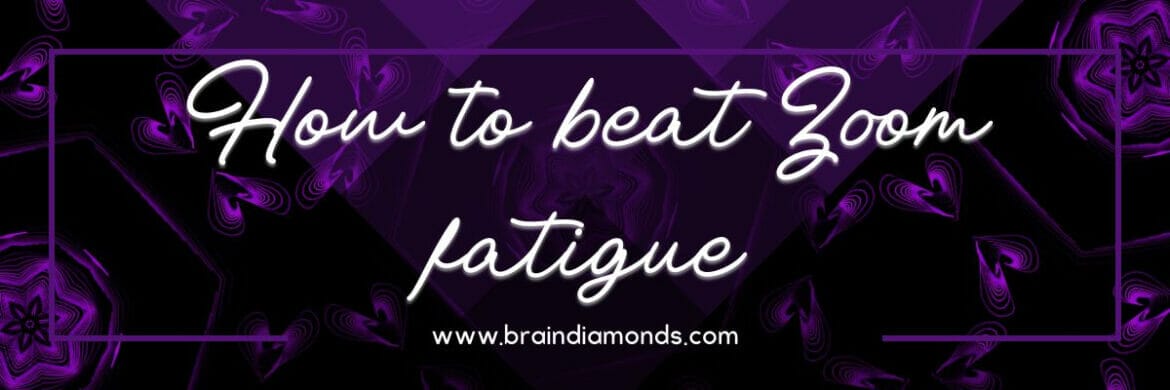

Can you relate? I’m feeling dearly exhausted after I had 4, 6, 8, or 10 Zoom meetings in a day.
One would think Zoom meetings are much easier. You don’t have to run from room to room, no need to prepare a flip-chart, and you can throw away the high heels.
However, we’re burned out after a day of virtual meetings.
But why?
Why Zoom meetings are exhausting
I recently read an article in The New York Times about meeting fatigue: The feeling of exhaustion and tiredness after virtual meetings. Video conferencing is strenuous for our brain. There are several reasons for that.
My favorite reason is the one Jeremy Bailenson (University of Stanford) mentioned in one of his articles: “When someone is close to you and stares at you, from an evolutionary standpoint, it means: You’ll fight or mate.”
Some more reasons:
Filters kill empathy
Another reason that’s not just a Zoom problem (because of Botox) is that the filters kill empathy. Even the simple Zoom filter washes out our faces, our wrinkles, and mimic that makes it harder to read us.
Camera position creates Zoom fatigue
In an online meeting, you can either
- stare into the camera, but you don’t see the other participant (s) properly
- watch the video of the other participant (s), but for the other party it appears you’re not paying attention to them
So if you talk and look at the cameras of the other people because you are paying attention, it appears as if you are not.
When we realize we’re not looking at the camera, we quickly stare into the empty black hole, but we lose the ability to catch non-verbal clues of the other participant.
The forth and back takes up a good 20% of my concentration. It’s a constant conflict where to look.
Have you ever met someone in-person, and they didn’t look you in the eyes? Wasn’t that annoying, or maybe it even made you feel insecure?
Perceived surveillance
A video conference with many participants is like watching television and the TV stares back at you.
We know someone is constantly watching us, or at least could watch us. It’s not comparable to an in-person meeting when we see if someone is looking, and it feels natural.
You can compare it to staring in a mirror for 8 hours straight. A mirror that shows you if you look tired, if your hair still looks nice, if you sit straight, how you react to the conversation… We’re not used to looking at yourself for such a long time, we’re not made for staring at ourselves non-stop, and it’s not healthy.
The distraction makes us even worse listeners than we already are.
It’s even worse if you’re the coach, and you’re the only one with their camera on.
You might ask yourself:
- are the others paying attention?
- are they looking at me?
- do I look fine?
- should I look at the camera or my presentation?
Missing non-verbal clues
In Zoom meetings, we're missing non-verbal clues. The language of the body is missing. Is someone tapping the table with their fingers? Are they tense? Do their feet point towards the door, which shows they want to get away from the meeting?
Still trying to get where someone is coming from and where they are at is hard labor in a Zoom meeting.
That’s another factor that makes virtual meetings so exhausting.
Constant communication
Until a few years back, we were traveling from meeting to meeting. We had downtime and breaks. I would listen to music in my car, relax on the plane. Even if you just walk from room to room, you have a few minutes to yourself. Well, realistically, we’d check our voicemails and be on the phone.
It’s too much. We often schedule Zoom meetings without a single minute break in-between. Concentrating on a conversation with no breaks is part of the reason for our Zoom fatigue and also decreases the quality of our conversation.
Virtual backgrounds & co
That’s a funny one. I was waiting for the right time to embed my favorite Zoom blooper in a “business”: context, and it finally came.
I look like a Zombie on camera. And, no, I am not vain. People would usually think that until they try to take pictures of me or a video. Then there would be awkward silence, and they don’t mention the topic again. I would rather not look better or worse at a Zoom meeting. I just want to look like myself.
So, I was experimenting with a software called “perfect cam”. It’s virtual make-up. However, when I forgot about it and drank from my cup or the internet connection was fuzzing, my human skin color and “mouth” were somewhere else.
I’ve attended many Zoom meetings where the background was irritating, or the virtual background blended out parts of the face of the other participants.
Nothing of that helps you to be an empathic listener.
Oh, and you'll find the video with my favorite Zoom blooper at the end.
Here are my top tips for beating Zoom fatigue:
- Get on the phone
Thanks to cell phones, we can move around freely. You’re not glued in front of your computer. You could even take your communication partner on a little walk. Most people are more relaxed when they’re not in front of a camera. Creating connection via phone conversations and reading people’s voices is the second best to in-person meetings. - Take breaks
Experts recommend a break of at least 5 minutes per hour. Back in the 90ties, a VP of sales said something that rang typically true: “If a meeting lasts over an hour, it’s not a topic for one meeting or people are repeating themselves.” - Skip meetings
It fascinates me how much time some leaders spend in meetings that would have produced the same result without their attendance. If it’s just about staying in the loop, meeting notes do the trick. - Cancel meetings altogether
Ask yourself before every virtual meeting: Is this meeting necessary? Can I replace it with an email, a call, or a chat? - Zoom days
Declare Zoom-free days. Make it at least one day per week, or two or three.
The single most effective way to beat Zoom fatigue is an in-person meeting.
Bonus question
No matter if in-person, virtual, or on the phone – meetings can annoy and exhaust. Here’s a question that helps you discover the pain-points of your team: “How can we make sure that our meetings are efficient and more fun?”
Resources
Zoom Fatigue: How to Politely Decline a Call During Quarantine
